The leading lady of Lord of the Rings' $1billion prequel: 'I'm going to be either famous or infamous'
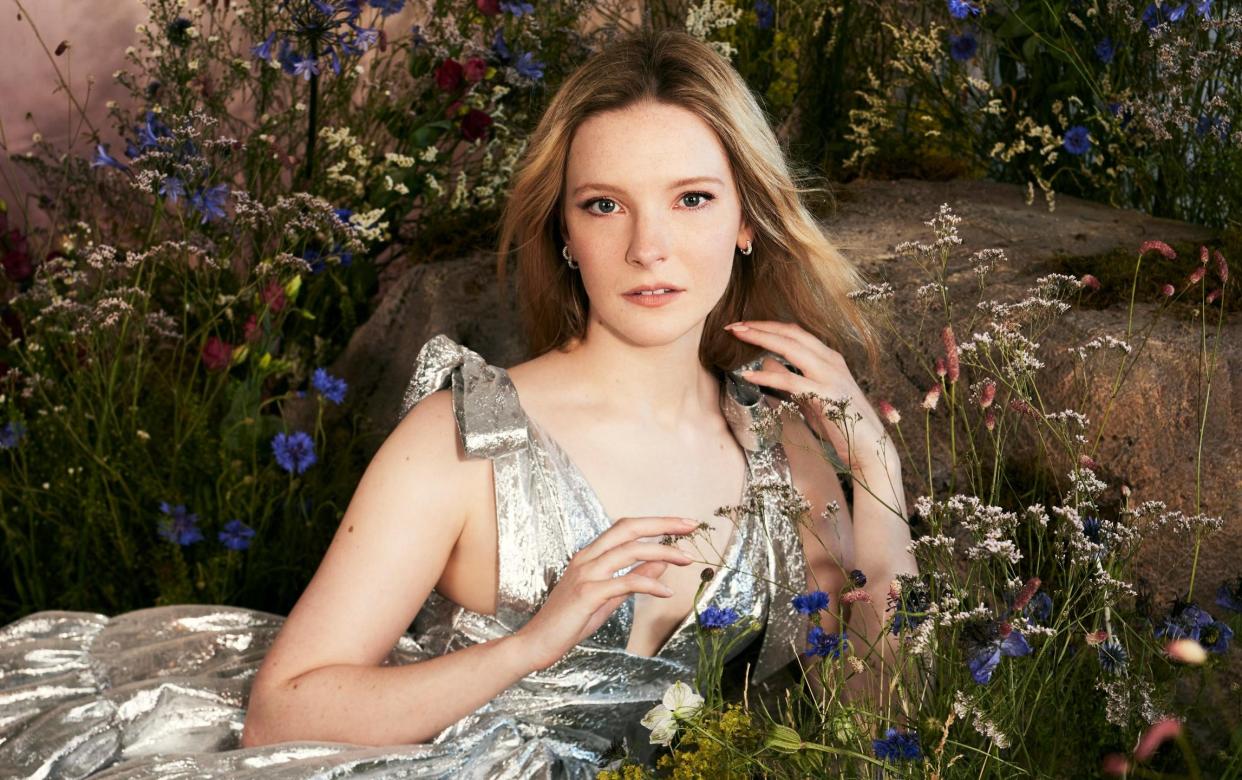
- Oops!Something went wrong.Please try again later.
‘Hello, I’m Morrrfyddth,’ says Morfydd Clark, having arrived with so little fanfare that it takes several long seconds to realise who she is. It is a hot day and we are at a studio in Peckham, where she will have her picture taken.
You expect a cover shoot with the star of the most expensive TV series to date would involve assistants, diva-ish demands and menacing publicists. Instead, there is just an amiable young woman wearing a red checked dress, trainers, and a vaguely medieval leather waistcoat. As she says her name she rolls the ‘r’ and puts a faint ‘th’ on the end. Hopefully she does not spot the open tab on her interviewer’s phone, which at that moment displays: ‘how Morfydd Welsh name pronounced’.
It turns out it is the same ‘r’ as in Mordor, the malignant land in JRR Tolkien’s The Lord of the Rings, which is convenient. After nearly a decade quietly building a reputation as an actor of rare depth and power, thanks to roles in Armando Iannucci’s The Personal History of David Copperfield and a compelling lead in the psychological horror Saint Maud, Clark has been summoned to Middle-earth.
On 2 September, the first series of prequel The Lord of the Rings: The Rings of Power, begins on Amazon Prime; rumours are that it will cost $1 billion. Clark is the young Galadriel, the elven princess played by Cate Blanchett in Peter Jackson’s blockbuster films. Although the series is an ensemble piece, Clark is at its heart; a warrior princess whose armour-clad form is all over the posters.

We speak when Clark, 33, has the antsy confidence of someone being sent over a waterfall in a barrel. ‘There is a strange element to it all,’ she says, over coffee. ‘You’re either going to be famous or infamous, because The Lord of the Rings is so loved and known about.’
If the series succeeds, Clark will soon be a household name. If it sinks, she will be part of a production that crashed one of the most beloved intellectual properties of the 20th century. No pressure.
‘Nobody knows what’s going to happen,’ she laughs. ‘Something’s going to happen. But to what degree, I don’t know.’
The Rings of Power details events in the Second Age, thousands of years before the events of The Hobbit, when the Rings were a twinkle in Lord Sauron’s large, fiery eye. In its scale and ambition, the series dwarfs, for want of a better pun, the earlier Lord of the Rings and Hobbit films, which were hardly two-bit garage operations.
‘It’s a little overwhelming,’ Clark admits. ‘My family are not pessimistic, exactly, but they had realistic expectations about acting as a career. When I was at drama school, we thought it would be great if I could do a play in Cardiff. This stuff feels surreal.’
Judging by a 20-minute trailer, presented to a few journalists in conditions of almost comic secrecy, the new version is highly promising. The scenery and special effects are as luxurious as you’d hope given Amazon’s largesse, but the script does not forget to mix a few laughs in with all the lore.
Clark’s version of Galadriel is considerably more kickass than Blanchett’s serene priestess, and in the trailer slays a demonic creature with athletic gusto. ‘You’ve seen more than I have,’ Clark says, pointing out that thanks to the green-screen CGI filming, she hasn’t even ‘seen the monster’. Filming started in New Zealand, where it was disrupted by Covid, before moving to the UK for the final months. Shooting on the other side of the planet, while her friends and family were locked down, took its toll.
‘It was strange to be experiencing something so different from the rest of the world,’ she says. ‘It put a glass ceiling on our happiness, because nobody could come out and see it. But I think it increased the bond between the cast. It felt like this secret world we all had.’
In person, you can see why you would cast Clark as an elf rather than, say, an orc. She has fine features and a wry, thoughtful manner. She fidgets. She speaks with a soft south-Welsh accent. As a self-confessed sci-fi and fantasy geek, Clark is aware of her part in changing perceptions of a genre that has a reputation for being white and male; at times oppressively so.
The earlier Lord of the Rings films were a straight interpretation of their source books. Whether dwarf, elf, wizard, hobbit or human, the heroes were all white men, the female characters were obviously secondary. The new series is drawn from more ephemeral writings, which has given the producers more latitude to match the dynamics to 21st-century expectations. Elves include Ismael Cruz Córdova, a Puerto Rican actor. There are black characters. On social media, Clark posts routinely about how proud she is to be part of a diverse cast.
But while it suits Hollywood’s desire for strong female leads, this more rough-and-tumble Galadriel is consistent with Tolkien’s vision of the character. ‘It was fascinating reading more into her,’ Clark says. ‘She lives for a long time, so a lot goes on in her life. She was called the Man-maiden when she was younger, because she was so tall and strong, and wore her hair wrapped up around her head. She doesn’t have the gift of foresight yet. She’s going to become more magical.’
Although she was conscious of giving glimpses of the character that Galadriel would become, Clark says she also had to ignore the baggage. ‘You have to shut all that off,’ she says. ‘My Galadriel can’t imagine she’s going to turn into Cate Blanchett one day. She doesn’t know if they’re going to survive. But you look at aspects of her character like, could there be such a thing as a naive elf? Probably not. But naivety for an elf would be arrogance, because they’ve not been shown that they can get things wrong.’
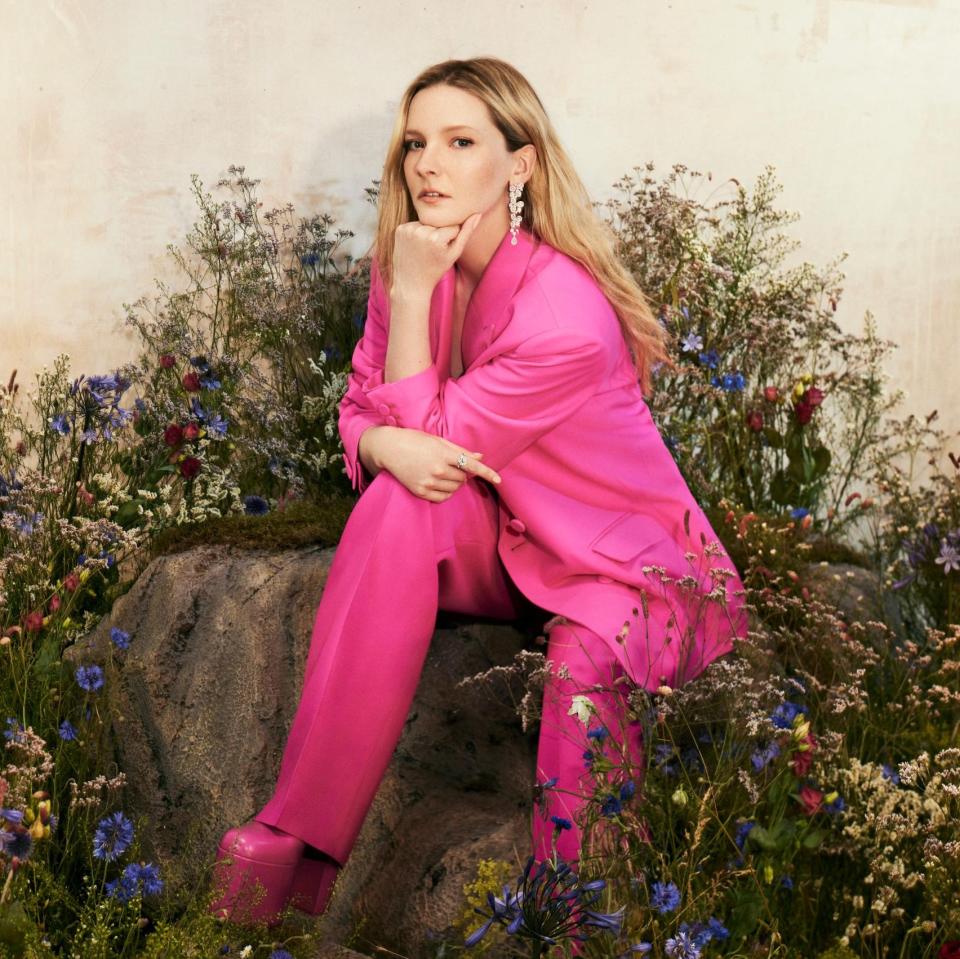
The Lord of the Rings is far from the only series to have been overtaken by politics. ‘I rewatched Buffy the Vampire Slayer recently and politically it has had its time,’ she says. ‘You look back and think there’s this huge bit they haven’t understood, and the creators had huge blind spots. There’s a lot of sexism. It seems so clunky and weird.
‘The problem with being older and into all of this stuff is that I am a creep,’ she laughs. ‘I’ve been a fan. It’s very weird that I’m suddenly invited into all this stuff. I shouldn’t be here!’
Clark says fantasy has been a refuge for her since she was a child. She was born in Sweden, but her family moved to Wales when she was four. Her mother was a doctor, her father did ‘something in computers’. Her parents are still in Cardiff, while her younger sister lives with her in a flat in south London.
Clark’s education was not always simple. When she was seven, she was diagnosed with ADHD, which has impacted everything she has done since. ‘I hated school,’ she says. ‘I was in trouble all the time and very bored. I was argumentative and never did my homework and never sat still.’ At 16, she was admitted to the National Youth Theatre. The experience was revelatory. ‘Suddenly I wasn’t being told off any more. That was huge. I was relaxed for the first time. I think acting was about chasing that feeling, more than chasing any sort of career.’
When she went on to study at the Drama Centre London, she found the arts focus of her Welsh-language school gave her a head start. ‘I had done a lot of plays compared to an English person,’ she says. ‘When I got to drama school, people told me they’d been bullied for doing drama. Not in a Welsh language school.’
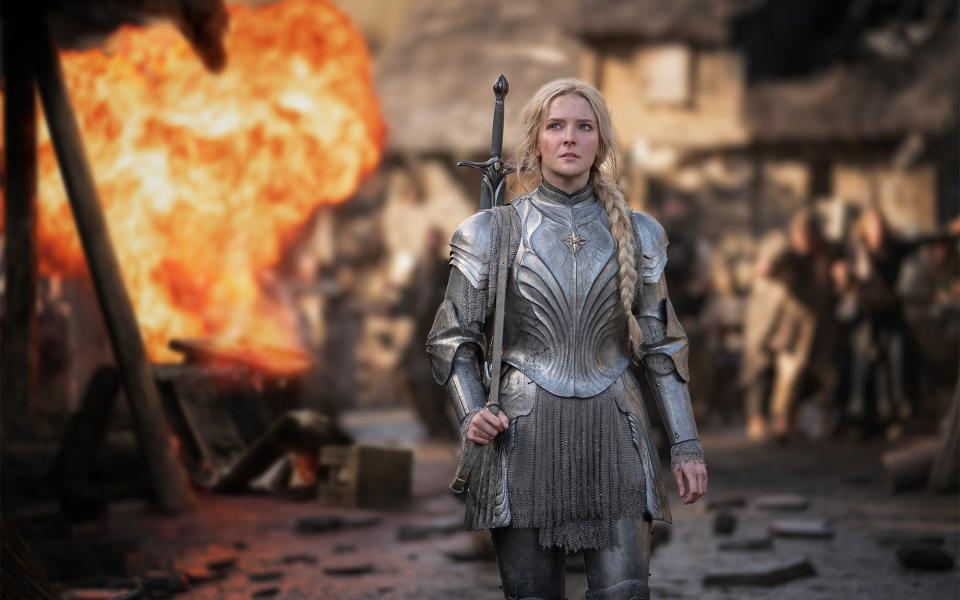
Welshness was also an advantage when it came to playing Galadriel. ‘I had no appreciation of what it meant to be bilingual [before I left Wales],’ she says. ‘You have access to so many more feelings. Your humour is different. Tolkien was obsessed with language. I was proud when my mum told me he based his language on Welsh. You can be very romantic and effusive in Welsh in a way that, in English, people would be like “oof, chill out”. It opens up a different part of you.’
After leaving drama school, Clark got an agent and played various roles in theatre and small TV parts, before Iannucci cast her in his 2019 adaptation of David Copperfield. She plays Copperfield’s love interest, Dora Spenlow, as well as his mother, Clara.
Of Clark, Iannucci says, ‘We met for lunch and I was so impressed that I told her at the end of the meal that I wanted her to do it. We shot her two parts so far apart that it was only afterwards I could see what an amazing job she had done, keeping them different. One is quite a tragic, vulnerable one, and one’s quite confident. I think that sums [Clark] up, her ability to take on these roles in a very subtle way. Before you know it, she’s someone completely different.
‘And she has great comic timing,’ he continues. ‘Which is not something you can teach. It’s nice to see the right people getting noticed.’
In 2019, Clark was in Toronto doing a promotional event for Copperfield when she found out she had been cast as Galadriel. She had to rush offstage, overwhelmed by it all. (The video is available on YouTube.) ‘She had just heard,’ says Iannucci. ‘Together with jet lag and the stage lights [it was too much]. She had to go off to take it in for a few minutes.’
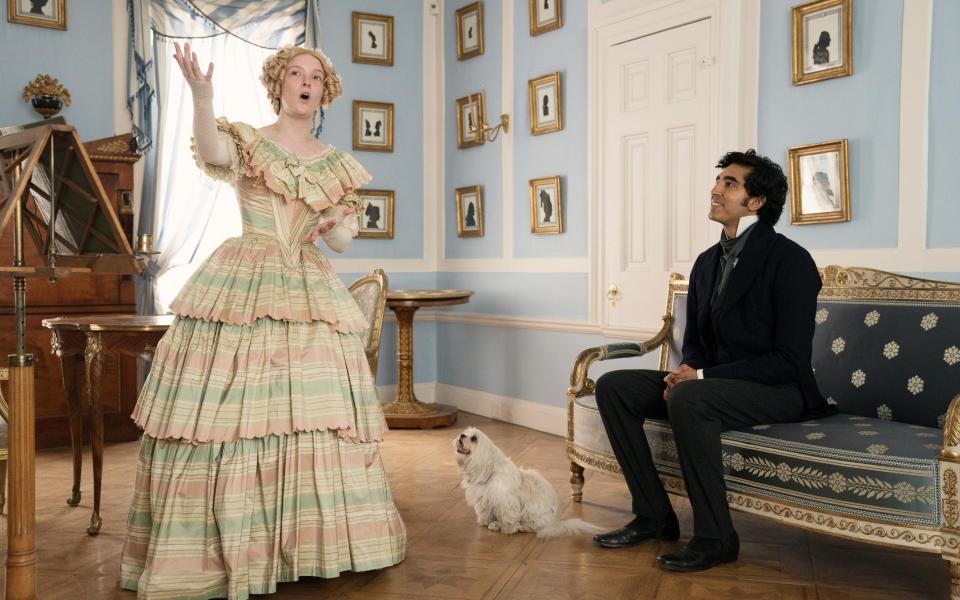
It was later that same year when Clark achieved greater prominence in Rose Glass’s debut feature, Saint Maud, a 90-minute vice of a thriller in which Clark is hardly out of shot, and for which she was nominated for a Rising Star Bafta. She plays Maud, an intensely Christian hospice nurse caring for a woman dying of cancer, played by Jennifer Ehle. It is a wincingly intense role, with Clark in almost every frame, which probes the border between religion and insanity. In one excruciating scene, Maud puts upright drawing pins in her shoes before stepping into them. Clark’s face betrays relief as well as physical agony.
‘She was the last to audition for us and it was a pretty easy decision,’ says Glass. ‘She had this haunting quality and you just want to watch her. Our film was so locked into one woman’s perspective so it needed to be someone you couldn’t keep your eyes off.’
I think her Galdriel will have a mystical humanity – and hopefully some unexpected laughs,’ she adds.
Clark seems to be drawn to psychological fringe cases. ‘I’m curious about extremes of personality and fragile people,’ admits Clark. ‘I feel conflicted talking about ADHD a lot, but it’s a huge part of why my life is what it is. There’s a Marina and the Diamonds song that says: “If I got rid of my demons, I’d lose my angels”. Everyone’s demons mean they can see other things. I guess mine is madness.
‘It’s weird to have a diagnosis from seven,’ she adds. ‘It makes you feel different or other, which feeds a fascination with brains and why people are the way they are. There are positives and negatives to it. I’m kind to myself about stuff I find difficult because I understand why. If I hadn’t become an actor I’d have needed access to the arts to get through my life. I would have been part of am-dram or art classes. It’s a type of medication.’
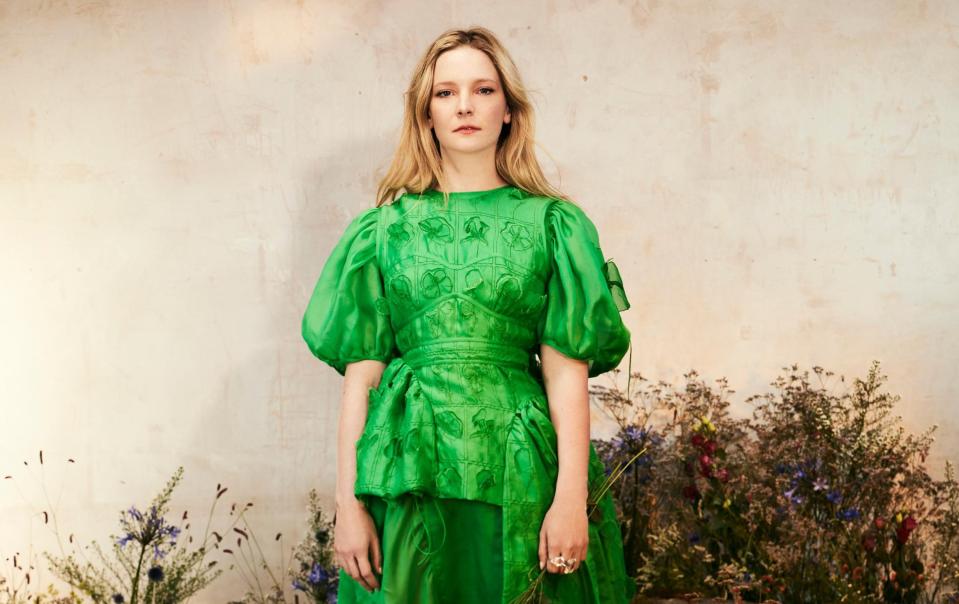
If on-screen she is drawn to extremes, off-screen, Clark seems content to enjoy things. She currently lives in a flat in Elephant and Castle with her younger sister, but would like a house of her own, a ‘handmade heaven’, as she says. Life is about to change dramatically for some of the cast, Clark almost certainly included, but she seems resoundly unstarry. The closest she comes to a diva-ish demand is to ask for lunch not to be smoked salmon. (She once ate some when she was ill, she explains apologetically.)
‘Maybe because I’m a bit older, I just want to have a happy, comfortable life,’ she says. She is supported by a group of friends that she has known from nursery school, most of whom are still in Cardiff. ‘They have no respect for me,’ she says, happily. One was crushed to learn she had been cast as Galadriel. ‘We used to have Lord of the Rings sleepovers together, so I broke confidentiality to tell her, and she was like, “Oh, really? I was looking forward to that. Now it’s just going to be you.”
‘I hope people can escape into [The Rings of Power],’ Clark continues. ‘It’s PG-13. One of the things I loved about Lord of the Rings was that I watched it when I was 11 with my parents, and the people behind us had their grandparents in there. It was enjoyed by this huge scope of people. I’d love it to be something people can bond over and talk about and play games about.’
Once she has seen off Mordor, she has another troubled kingdom to attend to. ‘I’ve been cast as Ophelia in Riz Ahmed’s Hamlet,’ she says. She may crave the simple life at home, but for Morfydd Clark, the madness is only just beginning.

